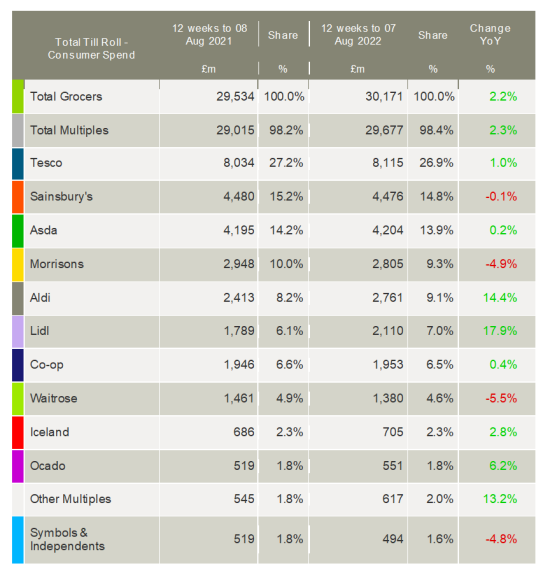Last week, one of the political parties suggested that the
UK Government should treat the cost-of-living crisis with a “wartime mentality”
and thus sparked a thought here at NamNews as we focused on our perpetual
search for practical solutions to Supplier-Retailer business problems…
Given the build-up of Cost-of-Living issues in the UK
including soaring food-price inflation, product shortages and energy price
increases all originating in Lockdown, followed by a succession of payment
holidays for businesses (Rent, Rates, and Tax) and ‘Government’ i.e. taxpayer
help via furloughs, all coming home to roost currently, it follows that some
drastic action is required.
Moreover, think also of recent cost increases that have
crept in as consumers borrowed to ease the pressure, with credit card borrowing
growing at its fastest pace since 2005, with interest on cards costing an average 21.66%
in July, rates for £10k personal loans rising in July to 4.18%, and overdraft rates still at all-time highs of 35.28%!
Others have attempted to explain how we have reached this
point but much of the blame can be placed on the decision to move off the Gold
Standard.
On August 15, 1971, the US came off the Gold Standard,
causing other countries to follow suit and in the UK ‘a pound was no longer a
pound’. In practice, this meant that
Governments could print money at will (Quantitative Easing) and thus run up
limitless Debt in the process. Cheap money lent recklessly via sub-prime
mortgages resulted in the Global Financial Crisis of 2008 when the Banks were
bailed out and became even more reckless….
At a Country level in terms of National Debt, anyone
thinking this QE and low-interest freedom would be handled responsibly can
easily put the issue in context by Googling ‘Interest paid on UK National Debt’
to find that the UK Interest Bill for June 2022 (one month!) was £19.4bn….
As a result of this Quantitative Easing, banks have been
able to borrow at near-zero interest rates and charge consumers the rates
outlined above. Unfortunately for all
except Civil Servants on inflation-proofed pensions, Inflation began to
increase, and as you know is predicted to shortly reach 13% by a very
conservative Bank of England.
Taking all of the above into account, combining inflation
with low growth, and low productivity, we believe we are headed into a
recession that will last five years or more, thus requiring a “wartime
mentality” on the part of the Government...
Speaking of wars, a recent chance discovery of a book by J K
Galbraith ‘The World Economy Since the Wars’ (I have admired his work since
reading his treatment of the 1929 Wall Street Crash) could provide us with an
approach on how the Government might take action to address the cost-of-living crisis, in a wartime context.
Towards the end of The Second World War, the UK was faced
with recession and a real danger of runaway inflation, and thereby had a need
for State Control of prices, rents and wages.
The wartime solution was to supplement the price controls
with a fairly comprehensive system of rationing that extended to canned goods,
meats, sugar, shoes, car tyres and petrol.
Whilst in WW2 rationing was implemented via coupons and ration-books,
nowadays a digital version combined with Tech-based insight re the consumer
buying and usage behaviour would probably result in a 100% leak-proof and fair system for all…
Incidentally, where supply was exceptionally short and need exceptionally
great, demand was thus brought forcibly into equilibrium with supply, thus
eliminating a major cause of inflation.
As you know there are two ways of increasing profits, even
in wartime. One way is to raise prices, the other to increase production, As Galbraith noted, price controls and
associated wage restraints made the increase of production the only available
course. Profit maximisation was served
horizontally by more production, not vertically by higher prices, a lesson for
all…
Monetary policy (interest rates):
To make all of this work, apart from managing consumer and
business compliance, it would be necessary to keep interest rates low,
effectively freezing interest rates at say 1% for the next five years of
anticipated recession. This means that
any necessary borrowing by consumers or businesses would be at minimal interest
rates, with a modest reward for lenders…
Lenders would thus be forced to seek increased profitability
via increased efficiency and cost saving. Consumers would be encouraged to clarify and communicate real need, thus
minimising the advantages of product overlap and duplication by suppliers and
retailers, who would in turn seek and provide real differentiation and be
encouraged to make every sale count by delivering more than it says on the tin,
every time….
Fiscal Policy (Tax and Government expenditure):
In contrast with the lightweight Monetary policy outlined
above, the collecting of taxes and government expenditure would be much more
aggressive… This would be a combination of high taxes on the fortunate few that
have access to offshore means of tax avoidance, and Tech Giants that have
hitherto contributed little to the tax pool.
Incidentally, keep in mind that the top rate of tax in the
UK was 95% for many years, by no means unprecedented.
In addition, there could be excess-profits taxes applied to
companies that have unfairly benefited from the Lockdown disruption of the past
three years… This unprecedented clawback of money via taxation could be used to
re-engineer/improve the NHS, and invest in improved provision of education for
those in need. The excess cash could
help to pay down National Debt and resource the negotiating of debt
write-of/forgiveness where possible.
Incidentally, given the restraints on expenditure, consumers
will probably save more, besides being encouraged to postpone expenditure by
relatively stable prices. The resulting build-up of consumers’ unspent money
could be absorbed via the sale of Government Bonds that could be redeemed for
spending at the end of the recession…
A key benefit of the above approach would be to lift the
consumer out of a necessary 24/7 obsession with the cost-of-living crisis,
thereby treating one to the hitherto unaddressed fall-out of Lockdown, mental
illness.
The resulting lack of sleep, skipping of meals to provide
sufficient nourishment for hungry children, walking in all weathers to avoid
the cost of public transport while a family car remains empty at home because
of the escalating cost of fuel, will all add up to a national problem with a
far greater downside and a knock-on effect on national morale that will fast
become unmanageable…
An even greater casualty could be trust, a willingness to
believe anything we are told. For instance, if part of the re-set agenda is to
replace physical cash with its digital equivalent, then continuing with the
current ‘abuse’ of money will compromise any hopes of a smooth transition.
Moreover, given the move from the Gold Standard, money has become a
fiat-currency, in that politicians are reliant on peoples’ belief in the value
proclaimed by the government!
If people lose sufficient trust in the Government, there is
a very real danger they could begin to require proof for any assertion made by
anyone in officialdom, spending more time second-guessing any offering, any
time, anywhere, any how….
Who knows, some could even begin to resist, and seek
alternatives…
Something clearly has to be done…
BTW, in terms of implementing its ‘wartime solution’ the
Government might not find it difficult to achieve high levels of compliance with
the above harsh regime. Best keep in
mind the relative ease with which almost 100% of the UK public were fully
supportive in terms of compliance re masks, social distancing, ‘jabs’ and
viewing of 15 minute Government TV briefings each evening for the past 2.5
years…
All else is detail.
by Brian Moore (bmoore@namnews.com - www.kamcity.com)
#SoaringInflation #CostOfLiving #PriceRises




